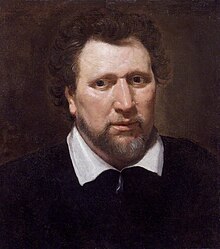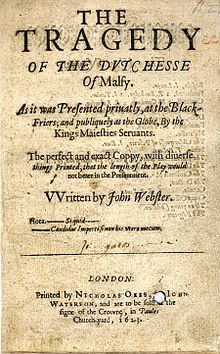Sonnets on English Dramatic Poets (1590–1650)




Sonnets on English Dramatic Poets (1590-1650) – cykl wierszy angielskiego poety Algernona Charlesa Swinburne’a[1][2], opublikowany w zbiorze Tristram of Lyonesse and Other Poems, który został wydany w 1882. Cykl zawiera utwory poświęcone najwybitniejszym przedstawicielom sceny elżbietańskiej, w tym Christopherowi Marlowe’owi, Williamowi Szekspirowi, Benowi Jonsonowi[3], Francisowi Beaumontowi i Johnowi Fletcherowi, Philipowi Massingerowi, Johnowi Fordowi[4], Johnowi Websterowi[5], Thomasowi Dekkerowi, Thomasowi Middletonowi, Thomasowi Heywoodowi, George’owi Chapmanowi i Jamesowi Shirleyowi[6].
- The dusk of day's decline was hard on dark
- When evening trembled round thy glowworm lamp
- That shone across her shades and dewy damp
- A small clear beacon whose benignant spark
- Was gracious yet for loiterers' eyes to mark,
- Though changed the watchword of our English camp
- Since the outposts rang round Marlowe's lion ramp.
- When thy steed's pace went ambling round Hyde Park.
- And in the thickening twilight under thee
- Walks Davenant, pensive in the paths where he,
- The blithest throat that ever carolled love
- In music made of morning's merriest heart,
- Glad Suckling, stumbled from his seat above
- And reeled on slippery roads of alien art.
Cykl składa się z dwudziestu jeden części. W przytoczonym utworze można zauważyć liczne aliteracje, typowe dla poetyki Swinburne’a[1]: The dusk of day's decline was hard on dark; In music made of morning's merriest heart. Swinburne wspomina też pomniejszych dramaturgów (między innymi Roberta Greene’a, Thomasa Kyda i Henry’ego Chettle’a) i utwory anonimowe.
- Greene, garlanded with February's few flowers,
- Ere March came in with Marlowe's rapturous rage:
- Peele, from whose hand the sweet white locks of age
- Took the mild chaplet woven of honoured hours:
- Nash, laughing hard: Lodge, flushed from lyric bowers:
- And Lilly, a goldfinch in a twisted cage
- Fed by some gay great lady's pettish page
- Till short sweet songs gush clear like short spring showers
- Kid, whose grim sport still gambolled over graves:
- And Chettle, in whose fresh funereal verse
- Weeps Marian yet on Robin's wildwood hearse:
- Cooke, whose light boat of song one soft breath saves,
- Sighed from a maiden's amorous mouth averse:
- Live likewise ye : Time takes not you for slaves.
Przypisy
[edytuj | edytuj kod]- ↑ a b Algernon Charles Swinburne, [w:] Encyclopædia Britannica [dostęp 2017-03-03] (ang.).
- ↑ Algernon Charles Swinburne, Poet (1837–1909). PoetryFoundation.org. [dostęp 2017-03-03]. (ang.).
- ↑ Ben Jonson, [w:] Encyclopædia Britannica [dostęp 2017-03-03] (ang.).
- ↑ John Ford, [w:] Encyclopædia Britannica [dostęp 2017-03-03] (ang.).
- ↑ Charles R. Forker: Skull Beneath the Skin: The Achievement of John Webster. books.google.pl, 1986. s. 480-481. [dostęp 2017-03-03]. (ang.).
- ↑ James Shirley, Poet (1596–1666). PoetryFoundation.org. [dostęp 2017-03-03]. (ang.).
Bibliografia
[edytuj | edytuj kod]- Algernon Charles Swinburne: Tristram of Lyonesse, and Other Poems. Archive.org, 1882. [dostęp 2017-03-02]. (ang.).
Linki zewnętrzne
[edytuj | edytuj kod]- Algernon Charles Swinburne (1837-1909). sonnets.org. [dostęp 2017-03-03]. (ang.).
